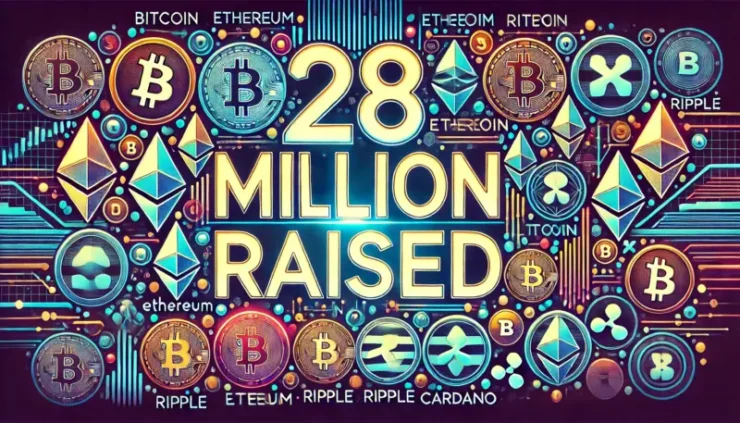DoubleZero Foundation raised $28 million in a funding round aimed at developing a global private fiber optic network tailored for high-performance blockchain infrastructure, marking a significant step toward its vision of enhancing blockchain transaction speeds beyond current internet capabilities.
The token funding round, completed at a valuation of $400 million, was co-led by prominent venture capital firms Multicoin Capital and Dragonfly Capital. Foundation Capital, Reciprocal Ventures, DBA, Borderless Capital, Superscrypt, and Frictionless also participated in the investment round, according to statements provided by the DoubleZero Foundation team.
The foundation is building what it describes as a “global fiber network” specifically designed to address challenges of bandwidth and latency that hinder blockchain performance on the existing public internet infrastructure. The organization plans to leverage privately operated fiber optic cables provided by independent network contributors, enabling blockchain data transmission to occur with significantly higher efficiency compared to public networks.
Austin Federa, president and co-founder of DoubleZero Foundation, explained the ambitious project as “essentially designed to become the new physical infrastructure backbone for high-performance blockchains.” Federa previously served as head of strategy at the Solana Foundation, bringing notable experience to the project.
Launching a Testnet Across Major Global Cities
DoubleZero has simultaneously announced the launch of its permissioned testnet, currently available to Solana validators and Remote Procedure Call (RPC) nodes. The testnet operates in major global technology hubs, including Singapore, Tokyo, Los Angeles, New York, London, Amsterdam, and Frankfurt. According to Federa, the immediate priority involves onboarding these validators before expanding into a broader permissionless testnet phase scheduled for the second half of this year.
The foundation emphasized its dedication to rapid deployment, noting that core contributors such as Malbec Labs and Jump Crypto are playing critical roles in rolling out the initial network infrastructure. At Solana’s Breakpoint conference last September, Jump Crypto’s Firedancer team successfully demonstrated a high-performance Solana client running on DoubleZero’s network infrastructure, underscoring the practical potential of the technology.
Kyle Samani, managing partner at Multicoin Capital, highlighted the significance of solving blockchain latency issues, stating that bandwidth limitations inherent in public internet infrastructure severely hinder a “Web2-like experience.” Samani sees DoubleZero’s targeted fiber network as essential in addressing these scaling challenges, improving blockchain reliability and responsiveness.
Strategic Investment and the Race for Partnerships
This investment arrives amid reports that DoubleZero Foundation is actively seeking strategic partners to further expand funding at a valuation of $600 million. The additional strategic financing round has not yet concluded, yet sources familiar with the process indicate strong competition among venture capital firms eager to secure allocations. The interest reflects the broader recognition of DoubleZero’s value proposition to blockchain networks.
DoubleZero’s network infrastructure currently relies on dedicated fiber lines operated by industry leaders such as Jump Crypto, RockawayX, Distributed Global, Latitude, and Teraswitch. The foundation remains open to additional telecom and fiber providers, inviting them to integrate their unused capacity into the rapidly growing network.
Federa humorously described DoubleZero as “crypto’s first infrastructure project” because of its unique reliance on extensive physical hardware—fiber optic cables stretching across both continents and oceans. Unlike traditional telecom ventures, DoubleZero does not intend to directly purchase or build expensive fiber optic infrastructure. Instead, the project leverages existing telecommunications companies eager to monetize underutilized network assets, echoing strategies used by Wall Street firms in their quest for faster transaction speeds.
Helius, a blockchain infrastructure firm, compared DoubleZero’s fiber network to hiring a private car service instead of using a rideshare app. Both deliver the passenger to the same destination, but the private option ensures a faster, more predictable experience. Reflecting on the needs of the blockchain community, Federa remarked, “We would like to exceed what’s possible on the public internet,” emphasizing DoubleZero’s compatibility with any blockchain network that demands high performance.
As blockchain transaction speeds continue to approach the standards seen in financial trading systems, Federa stated, “We’re just getting to the point where blockchains are fast enough to make use of that.” DoubleZero’s ultimate ambition is supporting Solana’s target of processing up to one million transactions per second, positioning the foundation as a key player in next-generation blockchain infrastructure.





